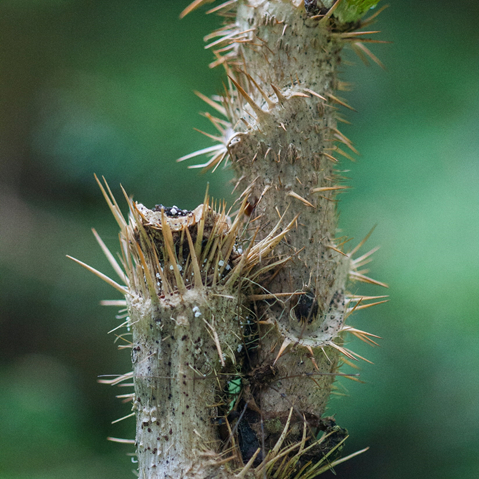
Devil's club
Scientific names: Oplopanax horridus, Echinopanax horridus, Fatsia horrida
Family: Araliaceae
Alternative names: Alaskan Ginseng, Bois Piquant, Cukilanarpak, Devils Club, Devil's Root, Fatsia, Garrote del Diablo, Panax Horridum
Actions: Antibacterial properties, Anti-cancer properties
Background
Devil's club is a plant. People use the inner bark of the root and stem for medicine.
Devil's club is used for arthritis, cancer, wounds, fever, tuberculosis, stomach trouble, cough, colds, sore throat, diabetes, low blood sugar, and pneumonia. It is also used for emptying the bowels and causing vomiting.
Some people apply devil's club directly to the skin for swollen glands, boils, sores, and skin infections. The ashes have been used to treat burns.
Devil's club is used for arthritis, cancer, wounds, fever, tuberculosis, stomach trouble, cough, colds, sore throat, diabetes, low blood sugar, and pneumonia. It is also used for emptying the bowels and causing vomiting.
Some people apply devil's club directly to the skin for swollen glands, boils, sores, and skin infections. The ashes have been used to treat burns.
Safety Safety definitions
There isn't enough information to know if devil's club is safe or what the possible side effects might be.
Special Precautions & Warnings:
Pregnancy and breast-feeding: Not enough is known about the use of devil's club during pregnancy and breast-feeding. Stay on the safe side and avoid use.Effectiveness
NatMed Pro rates effectiveness based on scientific evidence according to the following scale: Effective, Likely Effective, Possibly Effective, Possibly Ineffective, Likely Ineffective, Ineffective, and Insufficient Evidence to Rate.
Insufficient evidence Effectiveness definitions
TAKEN BY MOUTH:
- Arthritis.
- Wounds.
- Fever.
- Tuberculosis.
- Stomach trouble.
- Coughs.
- Colds.
- Pneumonia.
- Diabetes.
- Low blood sugar.
- Emptying the bowels.
- Causing vomiting.
- Other conditions.
APPLIED TO THE SKIN:
- Swollen glands.
- Boils.
- Sores.
- Skin infections.
- Other conditions.
Dosing & administration
The appropriate dose of devil's club depends on several factors such as the user's age, health, and several other conditions. At this time there is not enough scientific information to determine an appropriate range of doses for devil's club. Keep in mind that natural products are not always necessarily safe and dosages can be important. Be sure to follow relevant directions on product labels and consult your pharmacist or physician or other healthcare professional before using.
Interactions with pharmaceuticals
It is not known if Devil's Club interacts with any medicines. Before taking Devil's Club, talk with your healthcare professional if you take any medications.
Interactions with herbs & supplements
There are no known interactions with herbs and supplements.
Interactions with foods
There are no known interactions with foods.
Action
Devil's club contains chemicals that might prevent certain cancer cells from growing and fight some bacteria, fungi, and viruses.
vital.ly has licensed monographs from TRC Healthcare.
This monograph was last reviewed on 31/07/2024 10:00:00. Monographs are reviewed and/or updated multiple times per month and at least once per year.
Natural Medicines disclaims any responsibility related to medical consequences of using any medical product. Effort is made to ensure that the information contained in this monograph is accurate at the time it was published. Consumers and medical professionals who consult this monograph are cautioned that any medical or product related decision is the sole responsibility of the consumer and/or the health care professional. A legal License Agreement sets limitations on downloading, storing, or printing content from this Database. No reproduction of this monograph or any content from this Database is permitted without written permission from the publisher. It is unlawful to download, store, or distribute content from this site.


